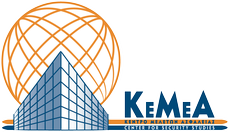The GCC consortium
GCC has assembled a unique set of Greek participants, leaders in their field not only at a national but at a European level as well. FORTH, the applicant and manager of the project, has been performing cutting-edge research in the area of cyber security, publishing in top venues, and leading (or participating in) several cyber security/forensics related projects. SafeNet, the Greek self-regulatory body for the Internet content, has been a leading figure in the area of Safer Internet, playing a leading role not only in Greece but in European Organizations as well. AUTH, the largest University in Greece, through its law school, has been in the forefront of exploring the interaction between law and ICT. Finally, KEMEA, the Center of the Ministry of Public Order and Citizen Protection authorized to participate in EU projects will involve the Law Enforcement Agencies and Public Sector of Greece and organizes their training seminars.
Following, are the detailed profiles of the GCC consortium partners.
FORTH-ICS
 The Foundation for Research and Technology - Hellas (FORTH) is the largest Greek State Research and Development Center. It consists of six Institutes; the Institute of Computer Science (ICS) is one of them. In its thirty-year history, FORTH-ICS has established itself as an internationally known and highly competitive research institute, with modern infrastructure and a broad range of research, development, and educational activities in computer science, computer engineering and in communications. FORTH-ICS is staffed by high quality personnel (Ph.D's, engineers,graduate students, research assistants and undergraduate student trainees).
The Foundation for Research and Technology - Hellas (FORTH) is the largest Greek State Research and Development Center. It consists of six Institutes; the Institute of Computer Science (ICS) is one of them. In its thirty-year history, FORTH-ICS has established itself as an internationally known and highly competitive research institute, with modern infrastructure and a broad range of research, development, and educational activities in computer science, computer engineering and in communications. FORTH-ICS is staffed by high quality personnel (Ph.D's, engineers,graduate students, research assistants and undergraduate student trainees).
FORTH participates to GCC through its Distributed Computing System Lab (DCS). For the past decade DCS has been a European leader in the area of Internet Security, cyber attacks, and Intrusion Detection Systems by publishing papers, leading high-profile research projects, and contributing to shaping the European policy in the area. Two particularly successful projects where the DCS lab has been involved are NoAH, a pilot European cyber security Infrastructure composed on affined honeypots, and LOBSTER, a European Infrastructure for detecting performance incidents and cyber attacks. Recently, DCS has been the founder and is currently the leader of SysSec: the European Network of Excellence in Emerging threats and Vulnerabilities for the Future Internet.
SafeNet
 SafeNet is the Greek self regulatory body for the Internet content. SafeNet’s mission is to promote self regulatory procedures for the safer use of the Internet, so as to protect children from being exploited by sites of indecent content (pornographic, violent, racist). SafeNet is a non profit organization supported by Greek Internet ISPs ((FORTHNET, OTEnet, HOL, GRNET etc.) to help insure that children surf the internet safely. SafeNet is a founding member of SafeLine, the Greek hotline for illegal internet content.
SafeNet is the Greek self regulatory body for the Internet content. SafeNet’s mission is to promote self regulatory procedures for the safer use of the Internet, so as to protect children from being exploited by sites of indecent content (pornographic, violent, racist). SafeNet is a non profit organization supported by Greek Internet ISPs ((FORTHNET, OTEnet, HOL, GRNET etc.) to help insure that children surf the internet safely. SafeNet is a founding member of SafeLine, the Greek hotline for illegal internet content.
AUTH-LEPS
 The Law School of the Faculty of Law, Economic and Political Sciences of the Aristotle University of Thessaloniki, with its rich history, important contributions to Greek legal culture and select academic staff, aims to provide young people with a comprehensive education in the science of law and mature researchers with opportunities for further research and specialization in various branches and sectors of this science. In this way it aspires to provide society with reliable interpreters and implementers of the law, responsible professionals in public positions, and, above all, useful and inspired champions of the law.
The Law School of the Faculty of Law, Economic and Political Sciences of the Aristotle University of Thessaloniki, with its rich history, important contributions to Greek legal culture and select academic staff, aims to provide young people with a comprehensive education in the science of law and mature researchers with opportunities for further research and specialization in various branches and sectors of this science. In this way it aspires to provide society with reliable interpreters and implementers of the law, responsible professionals in public positions, and, above all, useful and inspired champions of the law.
KEMEA
 The Center for Security Studies (KEMEA) has been established by law No. 3387/2005 in order to conduct theoretical and applied research, studies, particularly at the strategic level on issues relating to security policy, as well as providing advisory services on these issues to the public and private sector. It is a legal entity governed by private law, has administrative and financial autonomy and operates under the rules of the private economy (self-financing entity) for the benefit of the public interest. KEMEA is supervised by the Minister of Public Order and Citizen Protection. In 2011 it was appointed by Presidential Decree No. 39 as the “National Contact Point” for the protection of European Critical infrastructures (ECIs) -“ECIP contact point” in accordance to Directive 2008/114/EC of the Council “regarding the definition and designation of the European Critical infrastructures and the assessment of the need to improve the protection of such infrastructures”. KEMEA is staffed by active officers of the all the supervised agencies of the Ministry of Public Order and Citizen Protection, civilian security experts from the public/state sector as well as IT specialists from the private sector.
The Center for Security Studies (KEMEA) has been established by law No. 3387/2005 in order to conduct theoretical and applied research, studies, particularly at the strategic level on issues relating to security policy, as well as providing advisory services on these issues to the public and private sector. It is a legal entity governed by private law, has administrative and financial autonomy and operates under the rules of the private economy (self-financing entity) for the benefit of the public interest. KEMEA is supervised by the Minister of Public Order and Citizen Protection. In 2011 it was appointed by Presidential Decree No. 39 as the “National Contact Point” for the protection of European Critical infrastructures (ECIs) -“ECIP contact point” in accordance to Directive 2008/114/EC of the Council “regarding the definition and designation of the European Critical infrastructures and the assessment of the need to improve the protection of such infrastructures”. KEMEA is staffed by active officers of the all the supervised agencies of the Ministry of Public Order and Citizen Protection, civilian security experts from the public/state sector as well as IT specialists from the private sector.
KEMEA is successfully participating in more than 25 research projects under the Seventh Framework Programme of the EC (DG Enterprise and Industry, DG Home Affairs and European Space Agency) in the broader area of Security, Safety and Protection. It has also participated actively as a member of the European Forum for Research and Innovation (ESRIF) and is a member to the board of directors of the European Organization for Security (EOS).
